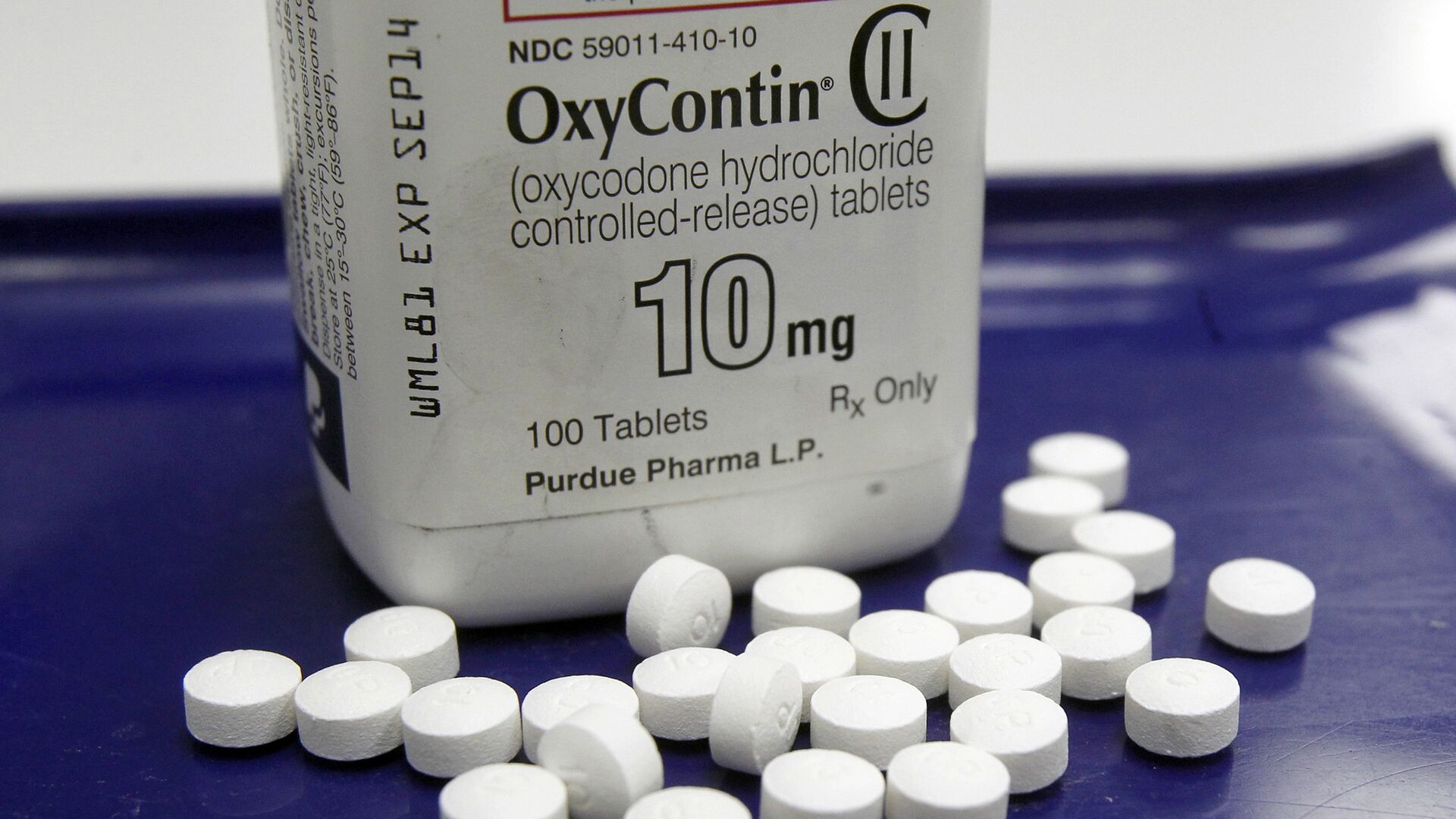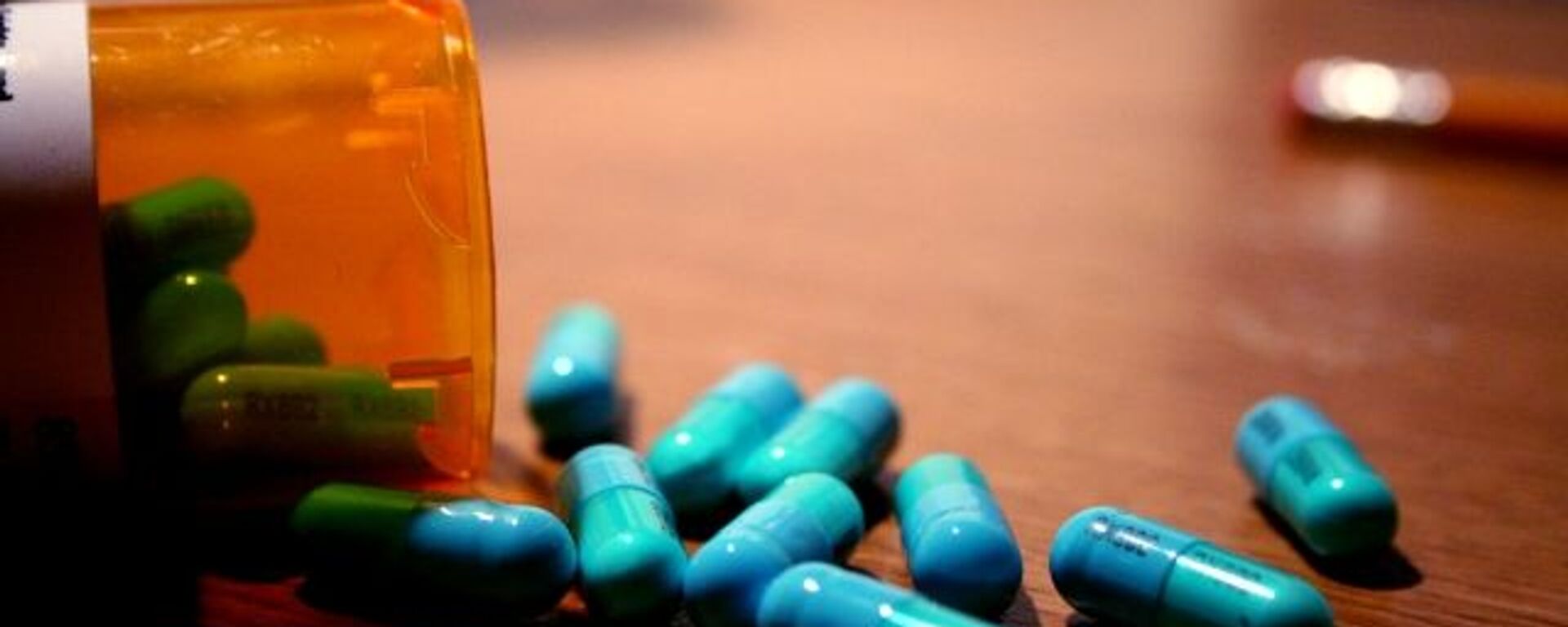https://sputnikglobe.com/20230531/sackler-family-given-immunity-in-6-billion-payout-deal-for-role-in-us-opioid-epidemic-1110823290.html
Sackler Family Given Immunity in $6 Billion Payout Deal for Role in US Opioid Epidemic
Sackler Family Given Immunity in $6 Billion Payout Deal for Role in US Opioid Epidemic
Sputnik International
A ruling by a US federal appeals court on Tuesday established a framework by which Purdue Pharma will pay out some $6 billion in settlement money for its role in sparking the US opioid epidemic.
2023-05-31T19:22+0000
2023-05-31T19:22+0000
2023-05-31T19:22+0000
americas
purdue pharma
opioid crisis
settlement
sackler family
us
https://cdn1.img.sputnikglobe.com/img/106784/87/1067848711_0:0:3000:1688_1920x0_80_0_0_1e3d3a03a8b8c8766e70219b3576cacc.jpg
The company was responsible for developing and aggressively marketing the opium-based painkiller Oxycontin in the 1990s and 2000s, creating a massive addiction problem that caused tens of thousands of deaths each year in the United States. During that time, the Sacklers raked in some $10 billion in profits off the drug sales.By late 2019, when Purdue Pharma declared bankruptcy, it was facing well over 2,000 lawsuits attempting to hold them responsible for the deaths, including from the state governments of more than half of all US states.In addition, Purdue pleaded guilty to three felonies in a separate case in 2020 and agreed to pay the DoJ $8.3 billion.In December 2021, a federal judge threw out the bankruptcy deal, saying the law didn't allow the Sacklers to be protected from legal claims against them. On Tuesday, a three-judge panel in a federal appeals court reversed that decision, saying that giving the Sacklers protection from future lawsuits was the best way to "ensure the fair distribution" of the settlement money.In response to the ruling, Connecticut Attorney General William Tong, whose state government was one of those that sued Purdue Pharma in 2018 and rejected the deal, accused the Sacklers of hiding behind the nation’s broken bankruptcy code "to escape justice and shield their blood money."In its own statement on Tuesday, Purdue Pharma said its mission now is to "deliver billions of dollars of value for victim compensation, opioid crisis abatement, and overdose rescue medicines."The magnitude of the impact has been so severe, it has caused life expectancy to decrease in the US. In 2022, that statistic sat at 76.2 years - the level it was at two decades ago.Michelle Williams, the dean of Harvard's T. H. Chan School of Public Health, agreed, noting that although the US is a leader in medical and health innovation, "I think where we are different [than other high-income countries] is that we emphasize rescue care, acute care at the expense of investing in, supporting, and enabling health promotion and disease prevention."
https://sputnikglobe.com/20230517/us-drug-shortage-nears-record-high-amid-supply-chain-disruptions---reports-1110425572.html
americas
Sputnik International
feedback@sputniknews.com
+74956456601
MIA „Rossiya Segodnya“
2023
News
en_EN
Sputnik International
feedback@sputniknews.com
+74956456601
MIA „Rossiya Segodnya“
Sputnik International
feedback@sputniknews.com
+74956456601
MIA „Rossiya Segodnya“
sackler; purdue pharma; opioid; settlement; opiate, opioid epidemic in us, who sells opioids, why so much opioids in us, american drug problem, who are sackler family, sackler family, sackler opioids, sackler family drugs
sackler; purdue pharma; opioid; settlement; opiate, opioid epidemic in us, who sells opioids, why so much opioids in us, american drug problem, who are sackler family, sackler family, sackler opioids, sackler family drugs
Sackler Family Given Immunity in $6 Billion Payout Deal for Role in US Opioid Epidemic
A ruling by a US federal appeals court on Tuesday established a framework by which Purdue Pharma will pay out some $6 billion in settlement money for its role in sparking the US opioid epidemic. However, the Sackler family that owns the company will also be protected from future lawsuits on the subject.
The company was responsible for developing and aggressively marketing the opium-based painkiller Oxycontin in the 1990s and 2000s, creating a massive addiction problem that caused tens of thousands of deaths each year in the United States. During that time, the Sacklers raked in some $10 billion in profits off the drug sales.
By late 2019, when
Purdue Pharma declared bankruptcy, it was facing well over 2,000 lawsuits attempting to hold them responsible for the deaths, including from the state governments of more than half of all US states.
Two years later, a federal court ordered the Sacklers to pay $4 billion toward a fund for paying out settlement money to families of those killed in the epidemic. The deal gave Sackler family members legal protection without requiring them to also declare bankruptcy, prompting a lawsuit by the US Department of Justice and the governments of nine US states.
In addition, Purdue pleaded guilty to three felonies in a separate case in 2020 and agreed to pay the DoJ $8.3 billion.
In December 2021, a federal judge threw out the bankruptcy deal, saying the law didn't allow the Sacklers to be protected from legal claims against them. On Tuesday, a three-judge panel in a federal appeals court reversed that decision, saying that giving the Sacklers protection from future lawsuits was the best way to "ensure the fair distribution" of the settlement money.
If the settlement deal is finalized, the Sackler family will also lose control of Purdue Pharma, which will be reformed as a new entity, Knoa, that will use its profits to fund addiction treatment programs.
In response to the ruling, Connecticut Attorney General William Tong, whose state government was one of those that sued Purdue Pharma in 2018 and rejected the deal, accused the Sacklers of hiding behind the nation’s broken bankruptcy code "to escape justice and shield their blood money."
"Our settlement was both significant and imperfect - there will never be enough justice to match the depths of pain and suffering the Sackler family caused," Tong said. "But we recognized that we had pushed this as far as we could, and that it was necessary to get communities, victims and their families the resolution and billions of dollars [of] funding desperately needed to save lives and fight the opioid epidemic."
In its own statement on Tuesday, Purdue Pharma said its mission now is to "deliver billions of dollars of value for victim compensation, opioid crisis abatement, and overdose rescue medicines."
Since the 1970s, the number of drug overdose deaths in the US has climbed every year, with the exception of 2018. However, they began skyrocketing amid the COVID-19 pandemic, with a 30% jump being recorded in 2020 and a 17% jump in 2021. According to federal data, roughly 110,000 deaths in 2022 were attributed to drug overdoses, with 75,000 of them being specifically blamed on synthetic opioids like fentanyl.
The magnitude of the impact has been so severe, it has caused life expectancy to decrease in the US. In 2022, that statistic sat at 76.2 years - the level it was at two decades ago.
"We have a wonderful sick care system that takes care of very sick people," Asaf Bitton, the director of Harvard University's Ariadne Labs, said podcast last month, "but a very inadequate health care system."
Michelle Williams, the dean of Harvard's T. H. Chan School of Public Health, agreed, noting that although the US is a leader in medical and health innovation, "I think where we are different [than other high-income countries] is that we emphasize rescue care, acute care at the expense of investing in, supporting, and enabling health promotion and disease prevention."



